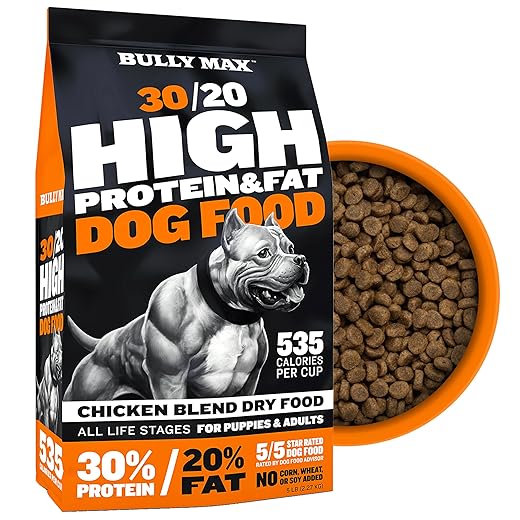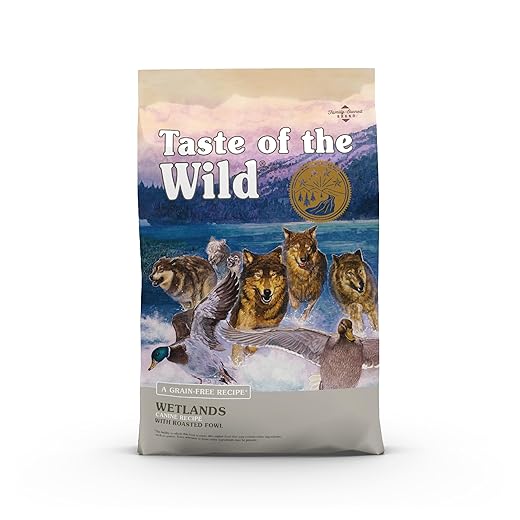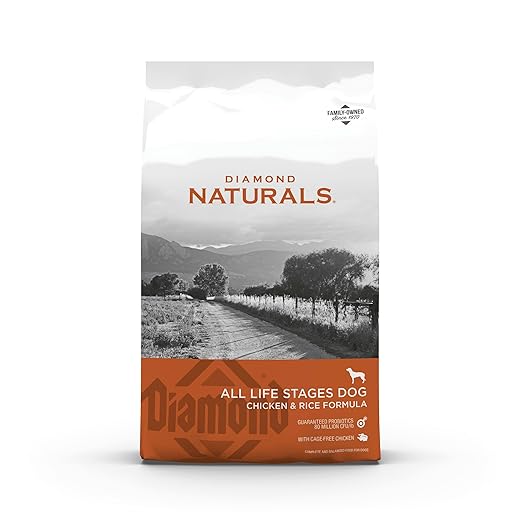Pitbulls, like all dogs, require a balanced and nutritious diet to support their overall health and well-being. Feeding your Pitbull the right food is essential for their growth, energy levels, muscle development, and immune system. Here is a short introduction about Pitbull food:
- Nutritional needs: Pitbulls are medium to large-sized dogs with high energy levels. They require a diet that is rich in high-quality protein, moderate in fat, and balanced with carbohydrates, vitamins, and minerals. Look for dog food formulas specifically designed for active breeds or large breeds, as these often meet the nutritional requirements of Pitbulls.
- Protein sources: Pitbulls benefit from animal-based protein sources such as chicken, beef, turkey, or fish. These proteins are essential for muscle development, repair, and overall growth. Avoid dog foods that primarily rely on plant-based proteins as they may not provide sufficient amino acids.
- Avoid fillers and by-products: When choosing food for your Pitbull, opt for options that do not contain fillers, artificial preservatives, or by-products. These ingredients offer little nutritional value and may be harder for your dog to digest.
- Age and activity level: Consider your Pitbull’s age and activity level when selecting food. Puppies require a balanced puppy formula to support their growth, while adult Pitbulls benefit from formulas tailored to their specific needs. If your Pitbull is highly active, choose a food that provides enough calories and nutrients to sustain their energy levels.
- Consult with a veterinarian: It’s always a good idea to consult with a veterinarian to determine the specific dietary needs of your Pitbull. They can provide guidance on portion sizes, feeding frequency, and recommend appropriate commercial dog food brands or even homemade meal options.
Remember to provide fresh water at all times and monitor your Pitbull’s weight and overall condition. Adjust their food portions as needed to maintain a healthy weight. Regular veterinary check-ups can also help ensure your Pitbull is on a suitable diet and address any specific dietary concerns or allergies they may have.
What is the best food for a Pitbull?
Choosing the best food for your Pitbull can depend on several factors, including their age, activity level, and any specific dietary needs or sensitivities they may have. Here are some key considerations when selecting food for your Pitbull:
- High-quality protein: Look for dog food that contains high-quality animal-based proteins as the primary ingredient. This can include sources like chicken, beef, turkey, or fish. The protein content should be sufficient to support your Pitbull’s muscle development and overall health.
- Balanced nutrition: Ensure the dog food provides a balanced mix of carbohydrates, fats, vitamins, and minerals to meet your Pitbull’s nutritional needs. Look for formulas that are specifically formulated for adult dogs or active breeds.
- Avoid common allergens: Pitbulls can be prone to food allergies or sensitivities, so it’s important to be mindful of potential allergens. Common allergens include grains (such as wheat, corn, and soy), artificial additives, and certain protein sources. Consider options that are grain-free or formulated for dogs with food sensitivities if your Pitbull has specific dietary requirements.
- Natural and wholesome ingredients: Opt for dog food that uses natural and wholesome ingredients without artificial preservatives, colors, or flavors. Avoid foods that contain fillers or by-products, as these offer little nutritional value.
- Consult with a veterinarian: Your veterinarian can provide valuable guidance on selecting the best food for your Pitbull based on their individual needs. They can help identify any specific dietary concerns or allergies and recommend suitable commercial dog food brands or even homemade meal options.
Remember that individual Pitbulls may have unique dietary requirements, so what works for one dog may not work for another. It’s essential to monitor your Pitbull’s weight, overall condition, and adjust their food portions as needed to maintain a healthy weight. Regular veterinary check-ups can help ensure your Pitbull’s diet is appropriate and make any necessary adjustments.
What protein is best for pitbulls?
The best protein sources for pitbulls are high-quality animal-based proteins. These proteins provide essential amino acids that support muscle development and overall health. Here are some protein options that are generally well-suited for pitbulls:
- Chicken: Lean chicken meat is a popular and easily digestible protein source for dogs. It is rich in essential amino acids and can be included in their diet as boneless, skinless chicken breast or chicken thighs.
- Turkey: Turkey is another lean protein source that is low in fat and can be a good alternative to chicken. It provides high-quality protein and essential nutrients.
- Beef: Lean cuts of beef, such as beef muscle meat, can be included in a pitbull’s diet. It is important to choose lean cuts to avoid excessive fat intake.
- Fish: Fish, such as salmon or white fish, is an excellent source of protein and omega-3 fatty acids. These fatty acids are beneficial for a pitbull’s skin, coat, and overall health.
- Eggs: Eggs are a complete protein source and can be given to pitbulls. Cooked eggs are preferable to raw eggs to avoid the risk of salmonella.
It’s important to choose high-quality, lean proteins and ensure they are cooked properly to eliminate any potential bacteria. Additionally, it’s recommended to consult with a veterinarian to determine the specific protein needs of your pitbull based on their age, weight, and activity level.
What type of food does a Pitbull eat?
Pitbulls can eat a variety of food types, including commercial dry kibble, wet/canned food, raw food, or a combination of these options. The specific type of food you choose for your Pitbull can depend on factors such as their age, health condition, activity level, and any dietary restrictions or preferences they may have.
- Dry kibble: Many Pitbull owners feed their dogs dry kibble as it is convenient, easy to store, and provides balanced nutrition. Look for high-quality kibble formulated for adult dogs or active breeds. Ensure that the kibble contains a good balance of protein, carbohydrates, fats, vitamins, and minerals.
- Wet/canned food: Wet or canned dog food can be an excellent option for Pitbulls who may have dental issues or are picky eaters. Wet food tends to have a higher moisture content, which can help keep your Pitbull hydrated. It is essential to choose high-quality wet food that offers balanced nutrition.
- Raw food: Some Pitbull owners choose to feed their dogs a raw food diet, often referred to as a “raw or BARF diet” (Biologically Appropriate Raw Food or Bones and Raw Food). This diet typically consists of raw meat, bones, fruits, vegetables, and other natural ingredients. However, it’s important to consult with a veterinarian or a canine nutritionist to ensure the diet is properly balanced and meets your Pitbull’s nutritional needs.
It’s important to note that regardless of the type of food you choose, it should be formulated to meet the specific nutritional requirements of Pitbulls or adult dogs. Always follow the feeding guidelines provided by the manufacturer and monitor your Pitbull’s weight and overall health to make any necessary adjustments.
Additionally, remember to provide fresh water at all times and avoid feeding your Pitbull any toxic foods such as chocolate, onions, garlic, grapes, or raisins, as these can be harmful to dogs. Regularly consult with your veterinarian to ensure your Pitbull’s diet is appropriate and make any necessary changes as they age or if any health concerns arise.
Do pitbulls eat rice?
Yes, pitbulls can eat rice as part of a balanced diet. Rice is a carbohydrate-rich food that can be a good source of energy for dogs. It is easily digestible and can provide fiber and some essential nutrients.
When feeding rice to your pitbull, it’s important to prepare it properly. Plain, cooked rice is typically the best option. Avoid adding any seasonings, spices, or oils, as these can be harmful to dogs. Additionally, ensure that the rice is cooked thoroughly and is not undercooked or seasoned with any ingredients that may be toxic to dogs, such as onions or garlic.
Rice can be mixed with other ingredients such as lean meats, vegetables, or commercial dog food to create a balanced meal for your pitbull. It’s important to remember that while rice can be a part of your pitbull’s diet, it should not be the sole source of nutrition. A well-balanced diet for a pitbull should include protein, carbohydrates, fats, vitamins, and minerals from a variety of sources to meet their nutritional needs.
As always, it’s a good idea to consult with your veterinarian or a canine nutritionist to determine the best diet plan for your pitbull, taking into consideration their individual needs, health condition, and any dietary restrictions or preferences they may have.
Do pitbulls eat chicken?
Yes, pitbulls can eat chicken as part of a balanced diet. Chicken is a common protein source in many dog foods and is often well-tolerated by dogs, including pitbulls. It is a lean meat that provides essential amino acids, vitamins, and minerals.
When feeding chicken to your pitbull, it’s important to prepare it properly. You should offer cooked chicken that is boneless, skinless, and free from any seasonings, spices, or additives. Avoid feeding raw chicken, as it can pose a risk of bacterial contamination.
You can incorporate chicken into your pitbull’s diet in different ways. It can be boiled, baked, or grilled, and then shredded or diced into appropriate portions for your dog. You can serve it alone or mix it with other ingredients such as rice, vegetables, or commercial dog food to create a balanced meal.
While chicken can be a healthy addition to your pitbull’s diet, it’s essential to ensure they receive a well-rounded and complete diet. This means providing a variety of protein sources, carbohydrates, healthy fats, and essential vitamins and minerals. Consulting with a veterinarian or a canine nutritionist can help you determine the appropriate portion sizes and dietary requirements for your pitbull’s specific needs.
Do pit bulls need special food?
Pitbulls do not necessarily require special food, but it is important to provide them with a well-balanced and nutritionally complete diet that meets their specific needs. Like all dogs, pitbulls benefit from high-quality dog food that is formulated to support their overall health and well-being.
Here are a few factors to consider when selecting food for your pitbull:
- Protein: Pitbulls are active dogs with strong muscles, so it is important to choose a dog food that contains high-quality protein sources, such as meat or fish. Look for a dog food that lists a specific protein source (e.g., chicken, beef, salmon) as the first ingredient.
- Balanced Nutrition: Ensure that the dog food provides a balanced mix of proteins, carbohydrates, healthy fats, vitamins, and minerals. Look for a dog food that is labeled as “complete and balanced” or meets the nutritional standards set by organizations such as the Association of American Feed Control Officials (AAFCO).
- Size and Age: Consider the size and age of your pitbull when selecting food. Puppies have different nutritional requirements than adult dogs, and large-breed puppies, in particular, may have specific dietary considerations. Some dog food brands offer formulations specifically designed for large-breed puppies or adult pitbulls.
- Allergies or Sensitivities: Some pitbulls may have food allergies or sensitivities, so it is important to monitor their reactions to different ingredients. If you suspect your pitbull has a food allergy or sensitivity, consult with a veterinarian to identify the potential allergen and discuss appropriate dietary options.
- Feeding Guidelines: Follow the recommended feeding guidelines provided by the dog food manufacturer based on your pitbull’s weight, age, and activity level. Adjust the portion sizes as needed to maintain a healthy weight for your dog.
Remember, it is always a good idea to consult with a veterinarian for personalized advice on feeding your pitbull. They can provide specific recommendations based on your dog’s individual needs, health condition, and any dietary considerations.
What foods Pitbulls Cannot eat?
While pitbulls can generally tolerate a wide range of foods, there are some foods that should be avoided as they can be toxic or harmful to dogs. Here are some foods that pitbulls should not eat:
- Chocolate: Chocolate contains theobromine, which is toxic to dogs. It can cause symptoms like vomiting, diarrhea, rapid breathing, increased heart rate, and even seizures or heart failure in severe cases.
- Grapes and raisins: Grapes and raisins can cause kidney failure in dogs. Even small amounts can be toxic and lead to symptoms such as vomiting, diarrhea, decreased appetite, and lethargy.
- Onions and garlic: Onions and garlic, whether raw, cooked, or in powdered form, contain compounds that can damage a dog’s red blood cells and cause anemia. Symptoms may include weakness, lethargy, pale gums, and an elevated heart rate.
- Avocado: Avocado contains a substance called persin, which can be toxic to dogs in large amounts. While the flesh of the avocado is generally considered safe for dogs, the pit, skin, and leaves should be avoided.
- Xylitol: Xylitol is a sugar substitute commonly found in sugar-free gum, candies, and some baked goods. It is highly toxic to dogs and can cause a sudden release of insulin, leading to a dangerous drop in blood sugar levels. Xylitol ingestion can result in symptoms such as vomiting, loss of coordination, seizures, and liver failure.
- Alcohol: Alcohol, including beer, wine, and spirits, is toxic to dogs. Even small amounts can cause serious health issues, including vomiting, diarrhea, difficulty breathing, and even coma or death.
- Caffeine: Caffeine, found in coffee, tea, energy drinks, and certain sodas, can be toxic to dogs. It can cause symptoms like restlessness, rapid breathing, increased heart rate, tremors, and even seizures.
It is important to note that this is not an exhaustive list, and there may be other foods that can be harmful to dogs. If you are unsure about the safety of a particular food, it is best to consult with a veterinarian before feeding it to your pitbull.
What should a Pitbull eat daily?
A pitbull’s daily diet should consist of a balanced and nutritious combination of protein, carbohydrates, fats, vitamins, and minerals. The specific dietary needs may vary depending on factors such as age, weight, activity level, and any underlying health conditions. Here are some general guidelines for a pitbull’s daily food intake:
- High-quality protein: Pitbulls are muscular dogs that benefit from a diet rich in animal-based protein. Good protein sources include lean meats like chicken, turkey, beef, and fish. Aim for a protein content of around 20-30% in their diet.
- Carbohydrates: Carbohydrates provide energy and can come from sources like whole grains (brown rice, oats), sweet potatoes, and vegetables. These should make up a smaller portion of their diet compared to protein.
- Healthy fats: Incorporate healthy fats into their diet, such as fish oil or flaxseed oil, which provide essential fatty acids for a healthy coat and skin.
- Fruits and vegetables: Include a variety of fruits and vegetables in their diet to provide vitamins, minerals, and antioxidants. Some safe options include carrots, green beans, apples, and blueberries. Be cautious of any fruits or vegetables that are toxic to dogs.
- Avoid fillers and artificial additives: Look for dog foods that are free from fillers like corn, wheat, and soy, as these can be difficult for pitbulls to digest. Also, avoid artificial additives, preservatives, and excessive amounts of salt or sugar.
- Adequate hydration: Ensure that your pitbull has access to fresh, clean water at all times. Hydration is important for their overall health and digestion.
It is recommended to consult with a veterinarian to determine the specific dietary needs of your pitbull based on their age, weight, and activity level. They can provide guidance on portion sizes, feeding frequency, and any necessary dietary modifications.
How do I keep my Pitbull smelling good?
To keep your Pitbull smelling good, here are some tips you can follow:
- Regular bathing: Bathe your Pitbull regularly using a mild dog shampoo specifically formulated for dogs. Be careful not to over-bathe them as it can strip away the natural oils from their skin, which may lead to dryness and odor.
- Proper drying: Thoroughly dry your Pitbull after bathing to prevent moisture from lingering on their skin, as it can contribute to odor and potentially skin issues. Use a towel or a low-heat setting on a blow dryer (if your dog is comfortable with it) to ensure they are completely dry.
- Dental hygiene: Maintaining good dental hygiene is essential for preventing bad breath, which can contribute to overall odor. Brush your Pitbull’s teeth regularly using a dog-friendly toothbrush and toothpaste. Dental chews and toys designed for dental health can also help keep their teeth clean.
- Regular grooming: Brush your Pitbull’s coat regularly to remove loose hair, dirt, and debris. This helps prevent mats and keeps their coat clean and fresh. Regular brushing also stimulates the natural oils in their skin, promoting a healthier coat and reducing odor.
- Balanced diet: Providing your Pitbull with a balanced and high-quality diet is important for their overall health, including their skin and coat. A healthy diet can help minimize skin issues and contribute to a fresher-smelling dog. Consult with your veterinarian to determine the best diet for your Pitbull’s specific needs.
- Clean bedding and living areas: Regularly clean your Pitbull’s bedding, blankets, and living areas to prevent odors from accumulating. Wash their bedding using pet-friendly detergents and ensure their living spaces are kept clean and free from dirt and debris.
Remember, every dog has a unique odor, and some level of natural doggy smell is normal. However, by following these tips, you can help keep your Pitbull smelling fresh and clean. If you notice any sudden or strong odors that are persistent or accompanied by other symptoms, it’s always a good idea to consult with a veterinarian to rule out any underlying health issues.
Conclusion
In conclusion, providing proper nutrition for your Pitbull is crucial for their overall health and well-being. When selecting food for your Pitbull, opt for high-quality, balanced dog food that is specifically formulated for their age, size, and activity level. Look for brands that use real meat as the main ingredient and avoid foods that contain artificial additives, fillers, or by-products.
It’s important to consult with your veterinarian to determine the specific dietary needs of your Pitbull, as individual dogs may have unique dietary requirements or restrictions. Regularly monitor your Pitbull’s weight and adjust their food intake accordingly to maintain a healthy body condition.
Additionally, consider providing your Pitbull with occasional healthy treats and supplements approved by your veterinarian, as well as ensuring they have access to fresh water at all times.
Remember, nutrition is just one aspect of caring for your Pitbull. Regular exercise, proper grooming, and routine veterinary care are equally important for their overall health and happiness. By providing a well-balanced diet and holistic care, you can help your Pitbull thrive and enjoy a long, healthy life.
You May Also Like These Deals!
Celebrate Pet Day with Our Exclusive Automatic Cat Feeder!
Are you ready to pamper your feline friend like never...
Read MoreIs DOGTV good for dogs?
DogTV is a unique television network designed specifically for dogs....
Read MoreWhy is it important to take care of pets?
Pet care is the practice of ensuring the well-being, health,...
Read MoreWhat can I feed my pitbull to gain muscle?
Feeding a Pitbull to support muscle development requires careful consideration...
Read MoreProducts recommended in the post contain affiliate links. We may receive a commission when you buy something through our posts.
Why Trust Us
You will find what you are looking for at Black Friday Weeks. From classic to luxury brands, you'll find both. We will help you to select appliances that fit your needs, budget and lifestyle. Whether you want to stop by to learn more — or plan to make a major purchase — we’ll treat you like family and assist you every step of the way. Shop with us today to receive friendly and experienced help along the way.















